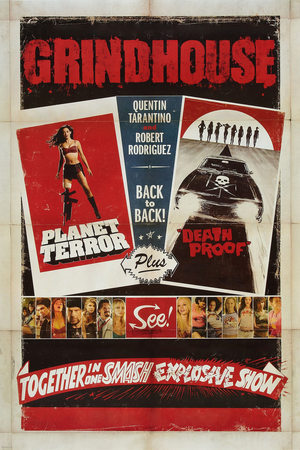
Grindhouse
Grindhouse exploits its modern B-movie experience through a bloody expressionistic tribute. Two feature films. Four fictional trailers (five if you’re lucky...). And an authentic conceptual presentation of the 70s exploitation genre, missing reels and all. Rodriguez/Tarantino’s admiration for cinema in general is tangible. Both a credible experiment in genre resurrection and a fetish for babes, blood and bolted machine gun legs. It is, at its core, a retrospective piece of entertainment. But does the double feature presentation, trailers included, work as a solid film in itself? Yes. Just about. Two of the four fictitious trailers worked. Wright’s ‘Don’t’ replicated the essence of Hammer Film Productions perfectly with a quintessential amount of British campiness to illustrate the ghoulish plot. Not to mention the laugh out loud vagueness of the title. Roth’s (yes, this is surprising...) was another hilarious trailer with ‘Thanksgiving’, a holiday-themed slasher. Imitating existing features, such as ‘Halloween’, to deliver a barrage of nudity and decapitations. Absurd, yet sadistically amusing. These two especially suited the overall aesthetic of Grindhouse, particularly with ‘Planet Terror’. Rodriguez’ ‘Machete’, which later became a feature film’, summoned the desolate heat of the Mexploitation sub-genre. It’s fine. Occasionally becomes lost in itself when Trejo is randomly throwing machetes everywhere. Zombie’s efforts in ‘Werewolf Women of the SS’ (I know...) didn’t work for me. The concept felt like he was trying way too hard in being over-the-top and radical by merging a bunch of sets together. Intentional or not, it juxtaposed the other trailers. Cage as Fu Manchu though, I want more! Although varying in quality, these trailers do provide impressive contributions to the overall presentation and are embedded intricately before each feature film. Speaking of features, do both ‘Planet Terror’ and ‘Death Proof’ work as a project of duality? No. The former is an absurdist’s perspective of the zombie genre, whereas the latter just resembled an ordinary Tarantino flick without the excessive exploitation. The two, together, have different paces, styles and tones which exhume varying levels of contrast, diminishing the whole feature’s flow. There’s plenty of passion and heart being injected into this project, ultimately resulting in an enjoyable cinematic experience. Yet a prevention exists that disallows me from fully connecting to the concept. A myriad of pastiches, with varying levels of quality, as opposed to an actual presentation. I’d watch it again just for ‘Death Proof’...
